- Home
- Stephanie Laurens
Royal Weddings: An Original Anthology
Royal Weddings: An Original Anthology Read online
Royal Weddings
An Original Anthology
Stephanie Laurens, Gaelen Foley, Loretta Chase
Contents
A Note from the Editor
The Wedding Planner
by Stephanie Laurens
Ever After
by Gaelen Foley
The Jilting of Lord Rothwick
by Loretta Chase
About the Authors
Coming Soon
Copyright
About the Publisher
A Note from the Editor
Dear Reader,
As you can imagine, everyone at Avon Romance is excited about the upcoming royal wedding of Prince William to Catherine Middleton. So when three talented authors—Stephanie Laurens, Gaelen Foley, and Loretta Chase—proposed this anthology we were thrilled. Each tale is a bit different, but each has a “royal touch” that I know you’re going to love.
In Stephanie Laurens’ The Wedding Planner, we’re introduced to Lady Margaret Dawlish, who I’ve grown to think of as “the wedding planner to the ton.” Now, she must plan a royal wedding as a French prince takes himself a bride. Along the way, Lady Margaret encounters so many of the obstacles found when you have to plan a wedding. (For example, who can stand to sit next to whom?) And fans of Lady Osbaldestone (I’m one of them!) will be happy to know that she most definitely makes her presence known in this tale.
Gaelen Foley’s Ever After takes place during the 1816 royal wedding of Princess Charlotte, daughter of the Regent, later King George IV, to Prince Leopold. Had she lived, this impulsive, willful, spoiled—but also warm-hearted and likeable—young woman would have become queen. There may never have been a Queen Victoria! It’s said that six hundred couples changed the date of their weddings to match hers. Her life ended tragically, but it’s nice to know that her marriage to her Leopold was a happy one.
In Loretta Chase’s The Jilting of Lord Rothwick, a charming wastrel must snatch back his chance to save his estate when he’s jilted by his very wealthy betrothed. This story takes place on the eve of Queen Victoria’s wedding to Prince Albert. In many ways, this was the first of the really “public” royal weddings. The newspapers had a field day, reporting on what Victoria wore (white, which was trendsetting), and what she carried (orange blossoms, also trendsetting). It helped that Victoria was nothing like the stout woman dressed in black who we think of today. She was young, vibrant, and, I think, rather pretty. And Albert really was handsome. Did you know that Victoria and Albert went on to have nine children? That sure says something!
I know you’re going to love these stories, and that you’ll join us in a royal celebration!
Best,
Lucia Macro
Vice-President, Executive Editor
Avon Books
The Wedding Planner
Stephanie Laurens
April 1820
London
“We never expected it to be a royal wedding!”
Lady Margaret Dawlish sat uncompromisingly upright on an uncomfortable chair in the drawing room of the Vicomte de Rocher’s town house and, ignoring the vicomte, striding agitatedly back and forth before the hearth, fixed a baleful glare on the two ladies responsible for dragging her there.
Seated on the chaise opposite, her youngest sister, Cicely, now Countess of Morwood, and Therese, Lady Osbaldestone, ignored her and watched the vicomte.
In typical melodramatic French fashion, he flung out his arms. “When they first started seeing more of each other, the Corsican Upstart was still rampaging through France. Even when Robert asked my permission to speak to Juliette, there was no certainty the Bourbons would regain the throne. Now, however—”
“Louis is safe on his throne in Versailles,” Meg crisply cut in, hoping to bring the vicomte’s dizzying perambulations to an end, “and Robert is therefore a prince of the royal house. Hence, you have a royal wedding on your hands.”
“Mais, oui.” The vicomte, a normally reserved and scholarly soul, turned to her. “Which, mademoiselle, is why we would appeal to you. You have experience in these matters—experience we—my wife and I—sorely lack. Yet it is imperative, for my honor and that of my wife’s family, too, that this wedding should be all it should be.”
Meg held his gaze for a moment, then looked at Lady Osbaldestone. Her ladyship met her gaze directly, her black eyes silently repeating the arguments she’d heaped on Meg’s head in the carriage on their way there.
It’s not just the vicomte and his wife—who, I would remind you, is English and a connection of sorts of yours—who need your help in this—it’s the entire ton, the palace, and the government to boot. We can’t have the French turning up their noses and saying we didn’t make a proper effort. Robert might be a sweet boy, and as easy to please as you might wish, but he’s now a full-blood prince of their realm, and they’ll be watching proceedings closely. The palace even sent one of the secretaries to inquire as to my advice, and your father will get a visit, too, should you refuse. When it comes down to it, there’s really only one person who can do this job. And that’s you.
She really had no choice.
After her fiancé had been killed at Waterloo, she’d turned the skills she would have brought to bear on managing his vast estates to planning the weddings of her three sisters and two brothers. And then the weddings of countless cousins. And then the weddings of several connections and acquaintances.
She did, indeed, know all the ropes, and as the eldest daughter of the Duke of Durham, she was also accustomed to protocol at the highest level.
Glancing at the vicomtesse, a petite, timorous, and retiring lady seated in an armchair beside the chaise, and receiving a pleading, almost panicking look in reply, Meg inwardly sighed and looked up at the vicomte. “Very well. I’ll undertake to organize Juliette and Robert’s wedding.” She held up a hand to stay their incipient thanks. “But you will all have to agree to do exactly as I say.”
They agreed, of course, and then they thanked her effusively. Lady Osbaldestone smiled, well pleased, while Cicely—bosom-bow of Juliette de Rocher—beamed, bounced up, and raced off to tell the affianced couple the good news.
May 1820, some weeks later
Drawing Room of Vicomte de Rocher’s town house, London
“This is the guest list.” The vicomtesse handed Meg six pages with names neatly lettered down one side, one name per line, as Meg had requested.
“Bon.” Although the vicomtesse and Juliette were English, born and bred, both frequently slipped into French, the principal language of the household, and as Meg also spoke French fluently—another reason she was perfect for this assignment—she’d picked up the habit. She glanced at the list. “Now, if you please, we’ll go over this and add the relationship to either groom or bride, and the relative importance of each person.”
Scanning the list, she could put faces to most names . . . “Who’s this?” She pointed to one entry high on the first page. “The Duc de Perigord. I can’t place him.”
The vicomtesse shifted on the chaise. “He’s Robert’s cousin. The head of his mother’s house.” She glanced at Juliette.
Who nodded. “Yes, that’s right. I haven’t met him, but he’s coming from his estates in the south of France. Robert said he’s to be his best man—his principal groomsman.”
“All right.” Meg made a note. “So he’s the senior male representing Robert’s mother’s side. Now, let’s start at the top with all the rest.”
They spent the next two hours defining the guests and family members, more than anything else clarifying precedence. Titles were one thing,
family relationships were another. Finally, Meg felt informed enough to make a start on the seating arrangements for the wedding and the breakfast to follow; she knew better than to leave the matter to Juliette and her mother—both were sweet, but not worldly.
Gathering the sheets, she said, “As I told your father when I spoke with him earlier, I’ve conferred with the various church and state authorities, and we’ve confirmed that the ceremony will take place on the eighteenth of June in St. James Chapel in Manchester Square.”
Juliette, who was already getting that rather strained look of all brides-to-be, relaxed a trifle. “Good. At least I’ll know where I am.”
St. James was the family’s customary church. Given both sides of the equation were of the Roman Catholic faith, Meg had of necessity sited the ceremony somewhere other than St. George’s, Hanover Square. Rising, tucking the sheets into the leather satchel she carried, she nodded briskly. “I’ll be arranging a rehearsal a few days before the wedding day. Please let all those in the wedding party itself know they will need to make themselves available—I’ll notify you of the time and date as soon as I have them set.”
June 15, 1820, 3:00 P.M., three days before the wedding
St. James Chapel, Manchester Square, London
“Where’s your best man—the principal groomsman?” Meg fixed Robert with an incipient frown. Everybody else in the wedding party had obeyed her orders, and was neatly arrayed before the altar, exactly as they should be.
In her peripheral vision, she saw a long, lean figure push away from one of the columns flanking the nave.
“I’m here.”
Even before, turning, she set eyes on him, his deep voice, faintly accented, triggered memories—a raft of memories she thought she’d forgotten long ago. Not that any memories prepared her for . . .
She stared at him—tall, long, lean, and even more overpowering than he had been, with his hair still black as a crow’s wing, and his aristocratically aesthetic features and eyes so dark they were pools of deepest night as mesmerizing as ever. Realizing she was staring, literally struck dumb, she forced herself to look down at her list. “You’re the Duc of Perigord?” Her tone was bordering on insult, but then . . .
Looking up, she found he’d drawn much closer—he moved so silently, so smoothly, so ineffably gracefully, she’d never learned the knack of making him keep his distance—and, as had happened years ago, his eyes were twinkling.
No other man had ever dared twinkle at her like that. She wasn’t sure any other man could. Almost as if he were . . . not laughing at her, but certainly amused, and in some odd way inviting her to be amused with him.
As if they shared a secret. Some secret understanding.
She realized she’d forgotten to breathe, with an effort rectified the lack.
His lips curved in a knowing smile, but to her relief, all he said was, “Louis reinstated the title. It was always mine.”
She’d previously known him as the Chevalier Devilliers. He’d followed his king into exile, had been in Louis the Pretender’s entourage for years. He was known as a superb swordsman, a cavalryman who had rallied the French nobles fighting on the side of the allies at Waterloo, and, if half the tales she’d heard were true, had performed feats of bravery upon that bloody field that had passed into legend . . . while elsewhere on that same battlefield, her fiancé, John Beaumont, had been cut down.
When her older brother Geoffrey, knowing she’d met Devilliers, had been telling her some of those tales, and she’d waspishly remarked at how unfair it was that such a reckless hothead like Gaston Devilliers had come through the battle unscathed while a cautious man like John Beaumont had died, Geoffrey had looked at her as if she’d been touched—as that had never happened, before or since, the moment was etched in her mind—and explained, “Beaumont was a loyal man, but his arm was weak. Devilliers . . . was a fiend on the field. No one came close enough to touch him. It takes more than courage to fight like that, and at the same time lead a group of men.”
She’d humphed and held her tongue.
And now the fiend stood before her, twinkling at her again.
But this time he stood on her battlefield.
She turned and pointed to the vacant space in the row before the altar. “Now you’re here, please take your place. We need to get this rehearsal under way.”
“Yes, ma’am.” The quiet words were taunting, of course, as was the polite salute he bestowed on her, but he did as she wanted and she was thankful enough for that.
As he walked—prowled, the man never simply walked—to his place in the line, she looked down at her list, grasped the pencil tied to her wrist and, lips compressed, wrote in capitals beside the name Duc de Perigord: GASTON.
June 15, 1820, 11:00 P.M.
Meg’s bedchamber, Durham House, London
“Thank you, Peggy. That will be all.”
“Yes, miss. Good night.”
Rising from her dressing stool and crossing to her bed, Meg heard the door shut behind her maid. Snuffing the single candle left on her bedside table, she let her robe slide from her shoulders, then slipped beneath the covers. Laying her head on her pillow, she stared at the ceiling.
She was about to let her mind slide to the topic she had until then not allowed it to explore, when soft footsteps approached her door, followed by a gentle tap.
The door opened and Cicely’s blond head appeared. “You’re not asleep yet, are you?” Without waiting for any answer, clad in a dressing robe, Cicely came in, shut the door, then glided to the bed and perched on its end, drawing up her knees and hugging them. “I thought the rehearsal went well, didn’t you? No dramas, no histrionics, and while Juliette and Robert were a trifle shaky, thanks to your notes everyone knew what they had to do.”
Cicely was Juliette’s matron of honor, so had been at the chapel, too. As matters stood, at the end of the ceremony it was Cicely who would walk up the aisle on Gaston Devilliers’s arm.
As if already thinking of that, Cicely leaned closer, over her knees, as if to share a confidence. “I wanted to ask about the Duc de Perigord. Gaston. You knew him from before, didn’t you?”
Stifling a sigh, Meg replied, “He was by Louis’s side through the Victory Celebrations in ’14, then we met again the following year, in Vienna during the Congress.”
Cicely pulled a face. “You were engaged to John then, but even you must admit Gaston is . . . well, breathtaking. He literally steals one’s breath. Those shoulders, those eyes, those . . . well, in truth it’s hard to find any element one might better.”
“His ego.”
“Really?” Cicely opened her eyes wide. “I hadn’t noticed.”
“Perhaps not quite that.” Meg had to admit that was uncalled for; one thing Gaston did not have was an overinflated view of himself. She tried to remember all the things about him that invariably got under her skin and itched. “He’s high-handed, arrogant, and exceedingly used to getting his own way. He’s stubborn, immovable, but he’s also wily and cunning—if he can’t go through, he’ll go around, or over, or under. But he always ends up where he wants to be.”
Cicely looked at her, then laughed. “You’ve just described yourself, sister dear.”
Meg humphed. “Perhaps. But all in all, Gaston is a pest. He . . . gets in my way.” That was it in a nutshell; he got in her way, and wouldn’t get out of it no matter what she did.
“Ah, but you have to admit he’s a handsome, charming, and really quite delectable pest.”
Meg leveled her gaze on her sister. “Might I remind you that you’re married, and that Hugh will be in the congregation?”
“I might be married, but I’m neither blind nor deaf—any female would have to be both not to notice and appreciate Gaston Devilliers.”
Meg didn’t wish to argue that.
Cicely went on, “Geoffrey told me of Gaston’s exploits at Waterloo. And apparently his estates are substantial.”
Meg didn’t want to know. She faked
a yawn. “Good night, Cicely.”
Cicely sighed and got up. “All right, I’ll leave you. But you have to admit that Gaston being Robert’s cousin has made this wedding much more interesting.”
Much more . . . trying was the word that sprang to Meg’s mind.
If she’d had any easy way out of the arrangement, she would have taken it, but as she had promised, and everyone—including the government and the palace—were counting on her, she would persevere.
Once Cicely had departed and shut the door again, Meg closed her eyes, and refused, adamantly refused, to think any more about an irritating Frenchman called Gaston.
Somewhat to her surprise, she slid easily into sleep . . . but the damned man followed her into her dreams.
June 16, 1820, 8:00 A.M., two days before the wedding
Rotten Row, Hyde Park, London
Ladies were not permitted to ride at a flat gallop down Rotten Row.
Meg didn’t exactly have special dispensation, but she was twenty-eight years old, long past her last prayers, and the hour at which she galloped was too early for any but the most hardened horsemen and horsewomen to see her, and as she was an exceptional horsewoman, they turned a blind eye. Or rather, they watched with open appreciation as, perched sidesaddle on her big gray’s back, she thundered down the tan track.
That morning, she needed to fly more than most; she needed to blow away the deadening sense of old regrets—regrets she’d never even known she possessed—that had beset her on awakening.
She was halfway down the track when she heard heavy hoofbeats following.
Closing.
She urged Atlas on, but the pursuing horse and rider drew ever closer.
She didn’t need to glance sideways to know who the rider was. Only one man—and it had to be a man—would dare.

 Lady Osbaldestone’s Plum Puddings: Lady Osbaldestone’s Christmas Chronicles Volume 3
Lady Osbaldestone’s Plum Puddings: Lady Osbaldestone’s Christmas Chronicles Volume 3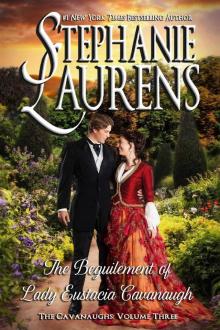 The Beguilement of Lady Eustacia Cavanagh: The Cavanaughs Volume 3
The Beguilement of Lady Eustacia Cavanagh: The Cavanaughs Volume 3 Loving Rose: The Redemption of Malcolm Sinclair (Casebook of Barnaby Adair)
Loving Rose: The Redemption of Malcolm Sinclair (Casebook of Barnaby Adair) By Winter's Light
By Winter's Light Devil's Bride
Devil's Bride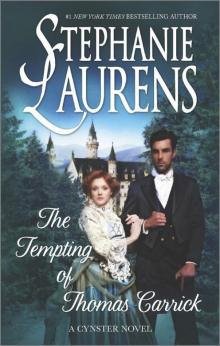 The Tempting of Thomas Carrick
The Tempting of Thomas Carrick![Cynster [22.00] A Match for Marcus Cynster Read online](http://i1.bookreadfree.com/i/03/16/cynster_[22_00]_a_match_for_marcus_cynster_preview.jpg) Cynster [22.00] A Match for Marcus Cynster
Cynster [22.00] A Match for Marcus Cynster All About Love c-6
All About Love c-6 Cobra 01 The Untamed Bride
Cobra 01 The Untamed Bride A Lady of Expectations and Other Stories
A Lady of Expectations and Other Stories By Winter's Light_A Cynster Novel
By Winter's Light_A Cynster Novel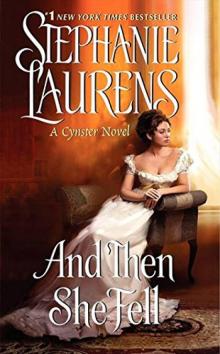 And Then She Fell
And Then She Fell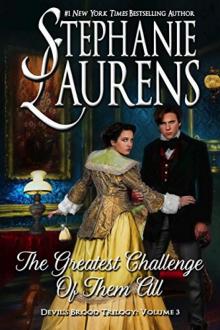 The Greatest Challenge of Them All
The Greatest Challenge of Them All The Edge of Desire
The Edge of Desire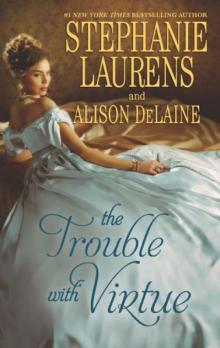 The Trouble With Virtue: A Comfortable WifeA Lady by Day
The Trouble With Virtue: A Comfortable WifeA Lady by Day Fair Juno
Fair Juno THE LEGEND OF NIMWAY HALL: 1750 - JACQUELINE
THE LEGEND OF NIMWAY HALL: 1750 - JACQUELINE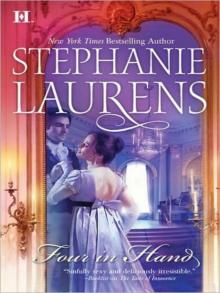 Four In Hand
Four In Hand The Reckless Bride
The Reckless Bride Stephanie Laurens Rogues' Reform Bundle
Stephanie Laurens Rogues' Reform Bundle The Untamed Bride Plus Black Cobra 02-03 and Special Excerpt
The Untamed Bride Plus Black Cobra 02-03 and Special Excerpt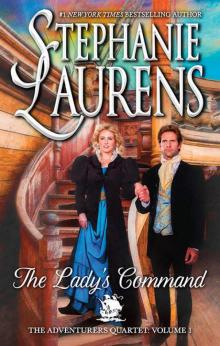 The Lady's Command (Adventurers Quartet #1)
The Lady's Command (Adventurers Quartet #1) The Seduction of Sebastian Trantor
The Seduction of Sebastian Trantor The Daredevil Snared (The Adventurers Quartet Book 3)
The Daredevil Snared (The Adventurers Quartet Book 3)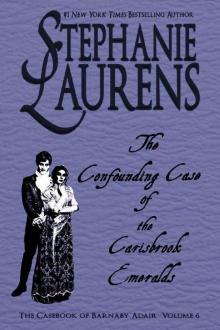 The Confounding Case Of The Carisbrook Emeralds (The Casebook of Barnaby Adair 6)
The Confounding Case Of The Carisbrook Emeralds (The Casebook of Barnaby Adair 6) Lord of the Privateers (The Adventurers Quartet)
Lord of the Privateers (The Adventurers Quartet)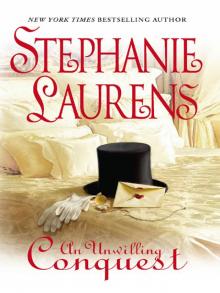 An Unwilling Conquest
An Unwilling Conquest Brazen Bride
Brazen Bride On a Wild Night
On a Wild Night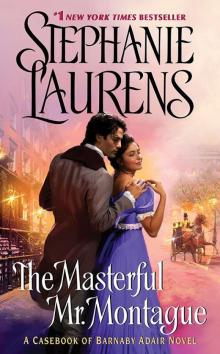 The Masterful Mr. Montague: A Casebook of Barnaby Adair Novel
The Masterful Mr. Montague: A Casebook of Barnaby Adair Novel Lord of the Privateers
Lord of the Privateers Royal Bridesmaids
Royal Bridesmaids Beyond Seduction
Beyond Seduction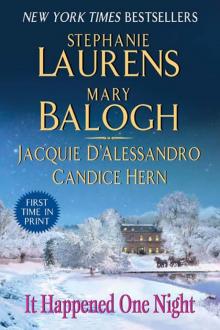 It Happened One Night
It Happened One Night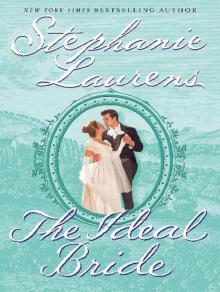 The Ideal Bride
The Ideal Bride The Promise in a Kiss
The Promise in a Kiss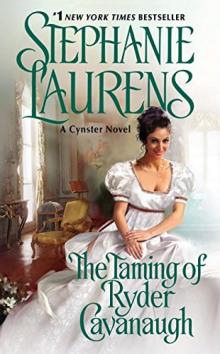 The Taming of Ryder Cavanaugh
The Taming of Ryder Cavanaugh The Ideal Bride c-12
The Ideal Bride c-12 All About Love
All About Love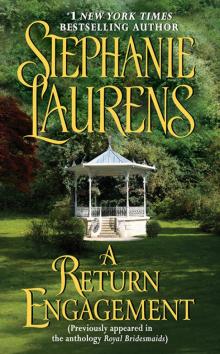 A Return Engagement
A Return Engagement The Untamed Bride Plus Two Full Novels and Bonus Material
The Untamed Bride Plus Two Full Novels and Bonus Material Viscount Breckenridge to the Rescue
Viscount Breckenridge to the Rescue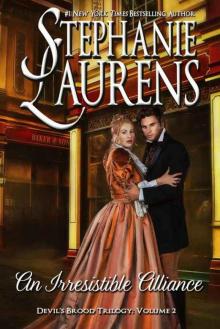 An Irresistible Alliance (Cynsters Next Generation Novels Book 5)
An Irresistible Alliance (Cynsters Next Generation Novels Book 5) The Daredevil Snared
The Daredevil Snared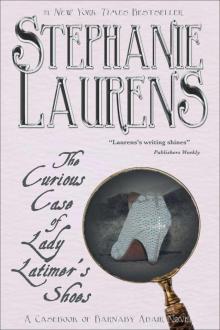 The Curious Case of Lady Latimer's Shoes: A Casebook of Barnaby Adair Novel
The Curious Case of Lady Latimer's Shoes: A Casebook of Barnaby Adair Novel A Lady of Expectations and Other Stories: A Lady of ExpectationsThe Secrets of a CourtesanHow to Woo a Spinster
A Lady of Expectations and Other Stories: A Lady of ExpectationsThe Secrets of a CourtesanHow to Woo a Spinster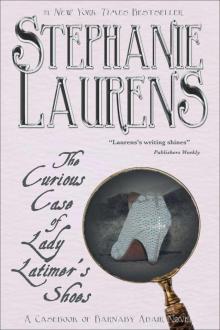 The Curious Case of Lady Latimer's Shoes: A Casebook of Barnaby Adair Novel (The Casebook of Barnaby Adair)
The Curious Case of Lady Latimer's Shoes: A Casebook of Barnaby Adair Novel (The Casebook of Barnaby Adair)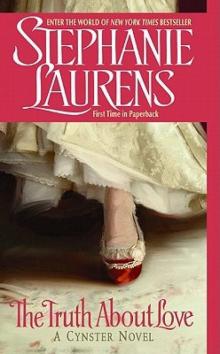 The Truth About Love
The Truth About Love A Rogue's Proposal
A Rogue's Proposal The Elusive Bride
The Elusive Bride The Perfect Lover
The Perfect Lover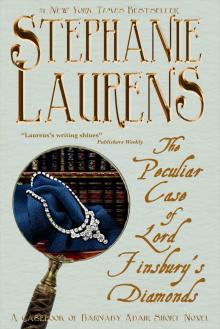 The Peculiar Case of Lord Finsbury's Diamonds: A Casebook of Barnaby Adair Short Novel
The Peculiar Case of Lord Finsbury's Diamonds: A Casebook of Barnaby Adair Short Novel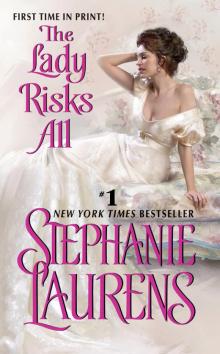 The Lady Risks All
The Lady Risks All The Murder at Mandeville Hall: The Casebook of Barnaby Adair: Volume 7
The Murder at Mandeville Hall: The Casebook of Barnaby Adair: Volume 7 All About Passion
All About Passion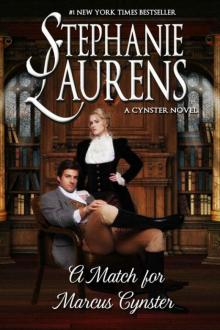 A Match for Marcus Cynster
A Match for Marcus Cynster By Winter's Light: A Cynster Novel (Cynster Special Book 2)
By Winter's Light: A Cynster Novel (Cynster Special Book 2)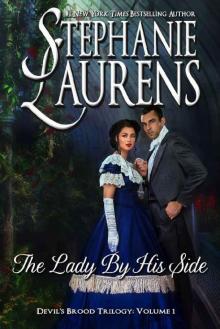 The Lady By His Side
The Lady By His Side The Pursuits of Lord Kit Cavanaugh
The Pursuits of Lord Kit Cavanaugh Tangled Reins
Tangled Reins To Distraction
To Distraction A Rake's Vow
A Rake's Vow A Comfortable Wife
A Comfortable Wife A Lady of His Own bc-3
A Lady of His Own bc-3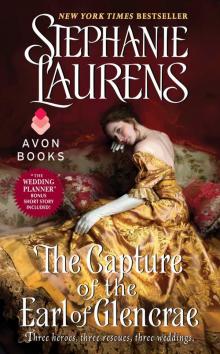 The Capture of the Earl of Glencrae
The Capture of the Earl of Glencrae Scandals Bride c-3
Scandals Bride c-3 Untamed Bride
Untamed Bride The Brazen Bride
The Brazen Bride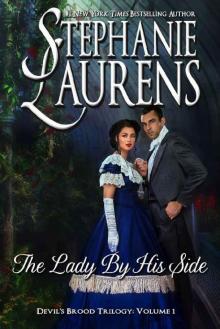 The Lady By His Side (Cynsters Next Generation Novels Book 4)
The Lady By His Side (Cynsters Next Generation Novels Book 4)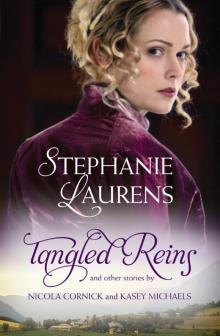 Tangled Reins and Other Stories
Tangled Reins and Other Stories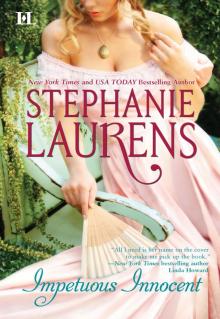 Impetuous Innocent
Impetuous Innocent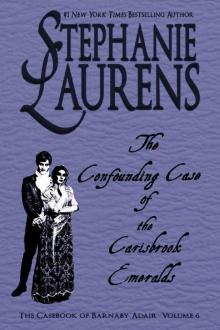 The Confounding Case Of The Carisbrook Emeralds
The Confounding Case Of The Carisbrook Emeralds Stephanie Laurens - B 6 Beyond Seduction
Stephanie Laurens - B 6 Beyond Seduction What Price Love?
What Price Love? A Fine Passion
A Fine Passion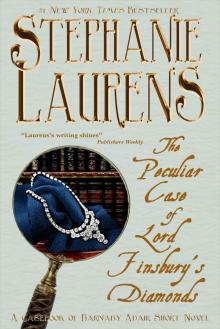 The Peculiar Case of Lord Finsbury's Diamonds: A Casebook of Barnaby Adair Short Novel (The Casebook of Barnaby Adair)
The Peculiar Case of Lord Finsbury's Diamonds: A Casebook of Barnaby Adair Short Novel (The Casebook of Barnaby Adair) Where the Heart Leads
Where the Heart Leads The Designs of Lord Randolph Cavanaugh
The Designs of Lord Randolph Cavanaugh A Secret Love c-5
A Secret Love c-5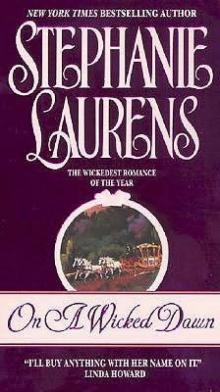 On a Wicked Dawn c-10
On a Wicked Dawn c-10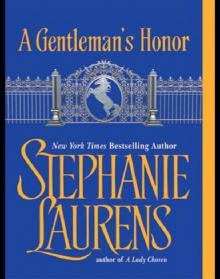 A Gentleman's Honor
A Gentleman's Honor THE LEGEND OF NIMWAY HALL_1750_JACQUELINE
THE LEGEND OF NIMWAY HALL_1750_JACQUELINE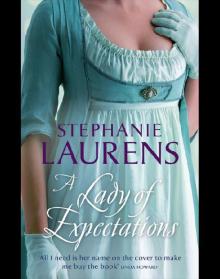 A Lady of Expectations
A Lady of Expectations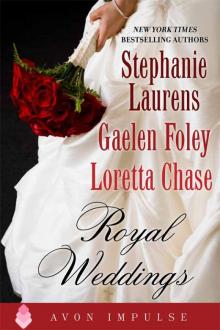 Royal Weddings: An Original Anthology
Royal Weddings: An Original Anthology The Ideal Bride (Cynster Novels)
The Ideal Bride (Cynster Novels) Mastered by Love
Mastered by Love A Buccaneer at Heart
A Buccaneer at Heart Captain Jack’s Woman / A Gentleman's Honor
Captain Jack’s Woman / A Gentleman's Honor Devil's Bride with Bonus Material
Devil's Bride with Bonus Material A Lady of His Own
A Lady of His Own A Secret Love
A Secret Love Melting Ice
Melting Ice Scandal's Bride
Scandal's Bride Lady Osbaldestone’s Christmas Goose
Lady Osbaldestone’s Christmas Goose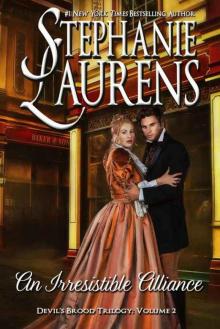 An Irresistible Alliance
An Irresistible Alliance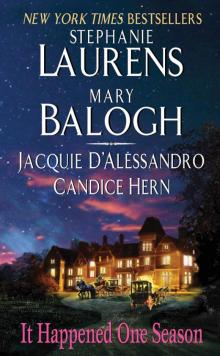 It Happened One Season
It Happened One Season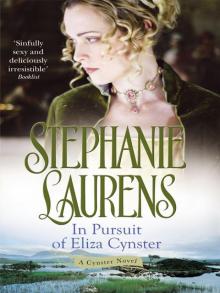 In Pursuit Of Eliza Cynster
In Pursuit Of Eliza Cynster Captain Jack's Woman
Captain Jack's Woman The promise in a kiss c-8
The promise in a kiss c-8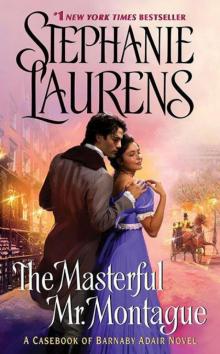 The Masterful Mr. Montague
The Masterful Mr. Montague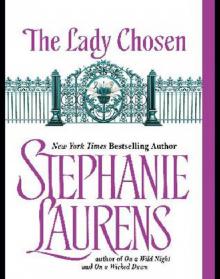 The Lady Chosen
The Lady Chosen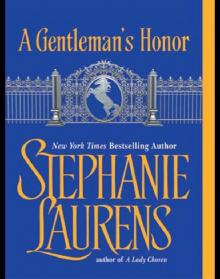 A Gentleman's Honor bc-2
A Gentleman's Honor bc-2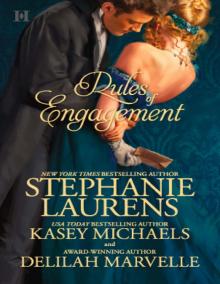 Rules of Engagement: The Reasons for MarriageThe Wedding PartyUnlaced (Lester Family)
Rules of Engagement: The Reasons for MarriageThe Wedding PartyUnlaced (Lester Family) Secrets of a Perfect Night
Secrets of a Perfect Night The Taste of Innocence
The Taste of Innocence On A Wicked Dawn
On A Wicked Dawn The Untamed Bride
The Untamed Bride A Rogues Proposal c-4
A Rogues Proposal c-4 Rakes Vow c-2
Rakes Vow c-2 Devils Bride c-1
Devils Bride c-1 Hero, Come Back
Hero, Come Back On a Wild Night c-8
On a Wild Night c-8 All About Passion c-7
All About Passion c-7